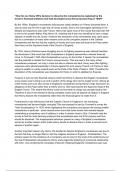Essay
AQA A Level History Tudors Example A* standard essay - Henry VIII financial policies and dissolution of the monasteries
- Vak
- Instelling
- Boek
“How far can Henry VIII’s decision to dissolve the monasteries be explained by the Crown’s financial problems that had developed since Henry became King in 1509?” Example essay response
[Meer zien]





